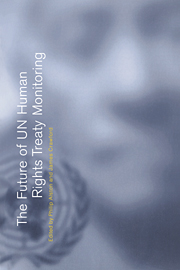Book contents
- Frontmatter
- Contents
- List of Tables, Figure, Appendices
- Notes on Contributors
- Editors' Preface
- Table of Treaties
- Table of Cases
- List of Abbreviations
- 1 The UN human rights treaty system: A system in crisis?
- A The UN human rights monitoring system in action
- 2 Individual claims in a world of massive violations: What role for the Human Rights Committee?
- 3 Decision-taking in the Committee on the Elimination of Racial Discrimination
- 4 The Committee on the Elimination of Discrimination against Women at the crossroads
- 5 The reporting process under the Convention on the Rights of the Child
- 6 The Committee on Economic, Social and Cultural Rights: Catalyst for change in a system needing reform
- 7 Country-oriented procedures under the Convention against Torture: Towards a new dynamism
- 8 UN human rights reporting procedures: An NGO perspective
- B National influences and responses
- C Regional and sectoral comparisons
- D Common challenges for the treaty bodies
- E Looking to the future
- Index
4 - The Committee on the Elimination of Discrimination against Women at the crossroads
Published online by Cambridge University Press: 23 December 2009
- Frontmatter
- Contents
- List of Tables, Figure, Appendices
- Notes on Contributors
- Editors' Preface
- Table of Treaties
- Table of Cases
- List of Abbreviations
- 1 The UN human rights treaty system: A system in crisis?
- A The UN human rights monitoring system in action
- 2 Individual claims in a world of massive violations: What role for the Human Rights Committee?
- 3 Decision-taking in the Committee on the Elimination of Racial Discrimination
- 4 The Committee on the Elimination of Discrimination against Women at the crossroads
- 5 The reporting process under the Convention on the Rights of the Child
- 6 The Committee on Economic, Social and Cultural Rights: Catalyst for change in a system needing reform
- 7 Country-oriented procedures under the Convention against Torture: Towards a new dynamism
- 8 UN human rights reporting procedures: An NGO perspective
- B National influences and responses
- C Regional and sectoral comparisons
- D Common challenges for the treaty bodies
- E Looking to the future
- Index
Summary
Introduction
Among the treaty bodies set up to monitor the implementation of the key international human rights instruments, the Committee of the Convention on the Elimination of Discrimination against Women has long been the least visible one for the international human rights community. Having started its work in 1982, it is only since the mid-1990s that a number of developments have provided greater opportunities for the Committee to increase its impact and visibility both within and outside the United Nations human rights treaty system.
The Convention on the Elimination of All Forms of Discrimination against Women (CEDAW) was adopted by the General Assembly of the United Nations on 18 December 1979, and entered into force on 3 September 1981. As of 9 December 1999, there were 165 states parties to the Convention, making it the second most widely accepted international human rights treaty after the Convention on the Rights of the Child (CRC), whose own success could be seen as helping to set the scene for increased attention to less traditional areas of human rights concern.
The Committee on the Elimination of Discrimination against Women was established by the provisions of article 17 of the Convention. The Committee has twenty-three members, experts who serve in their personal capacity, although they are nominated and elected by states parties with due regard to equitable geographical distribution. A principle meant to guarantee the representation of different forms of civilisation and the principal legal systems, the political imperatives of elections based on such mechanisms have not spared the CEDAW Committee any more than any other UN expert body.
- Type
- Chapter
- Information
- The Future of UN Human Rights Treaty Monitoring , pp. 79 - 112Publisher: Cambridge University PressPrint publication year: 2000
- 4
- Cited by



